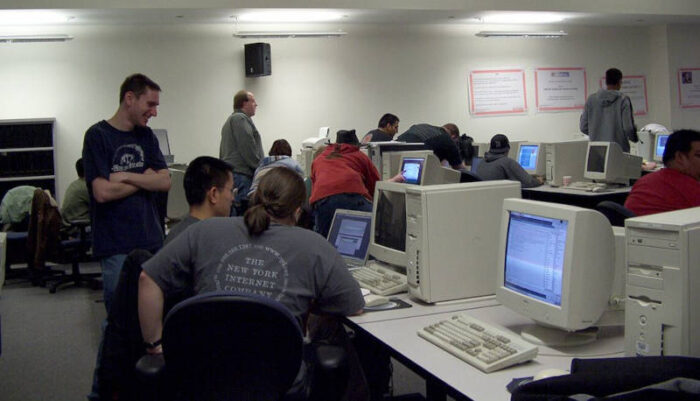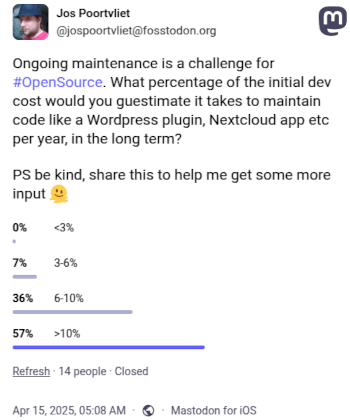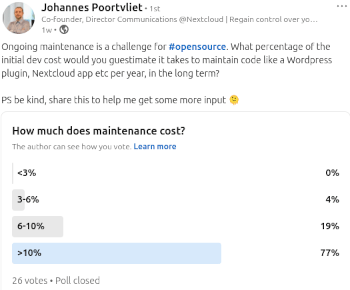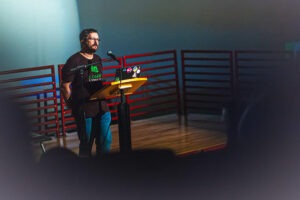The co-founder of the open-source company Nextcloud reminds us that the free software philosophy that’s the foundation of open source is much more than a software development model.

Open Source has won. Seriously. The Linux Foundation found in a study in 2022 that 70-90% of all code bases are made up of open source. Black Duck reported in 2023 that 96% of all software projects contain at least some open source. So we’re everywhere, we’re done.
Cue the famous XKCD dependency comic.
This picture is sadly very realistic. The median open source project has one maintainer!
So why did this happen? I argue there’s been a cultural shift. Most of the “old guard” in open source, and I’m certainly one of them, come from a free software background, where there’s a big dose of idealism. But to gain acceptance, we’ve hidden that idealism: a company wouldn’t want to build its enterprise on the work of a bunch of hippies, now would it? Working for free isn’t sustainable either, so open source had to mean business. We worked hard on that, by donning suits to argue with politicians and business folks that open source would be good for business and the economy.
We were successful. Perhaps too successful, because unfortunately this has resulted in open source being equated with free… as in beer. You know, that kind of freedom with a lower case “f.” For the current generation of engineers, open source means you can import a library from GitHub into a project and it won’t cost a dime. If there’s something wrong with it, just fix it in the local copy. That’s it.

So, we get this: Cue the XKCD image again.
Where is the community? Where is the drive to make the world a little bit better? Where is the conversation about sustainability, funding, governance? Upsteam first?

The new generation of open source devs doesn’t really seem to spend much time thinking about those factors at all. For them, open source is just magic code that appears, that somebody (usually a 50-year-old working in their spare time) built, and which can be used without strings attached. They are barely, if at all aware of the idealists that once upon a time built this community.
Of course, some companies still have a lot of institutionalized knowledge. Red Hat, SUSE, and a few others still have the old guard in their higher management, and thus strong upstream-first policies. But new companies and new projects — not so much. They fork at will, fragmenting the ecosystem and only occasionally contribute upstream.
This causes issues for the existing projects.
I ran a poll, asking about the cost of maintaining a piece of code like a WordPress plugin or a Nextcloud app. I asked, how much of the initial development costs does it require to keep it working, stable, and secure?
The results? It’s clearly more than 10% on both Mastodon and Linkedin.
Most projects don’t have these resources, especially when the number of contributors is dwindling. Once-large projects like KDE and Gnome are smaller today than they were 10 years ago, despite having arguably more users. If the attitude is to just take the code and if there’s an issue, fix it locally, we will never maintain our code once that last maintainer, working for free, quits.
That is not sustainable. I don’t need to explain that, do I? How do we fix this?
There has been quite a number of attempts at finding sustainable models. Some projects succeeded with donations. Others, like my own Nextcloud, managed to build a business. But both of these are exceptions.
There are many pieces to the puzzle, but here’s a big one: I think we went too far in the direction of serious business, and lost sight of the idealism that started our community and its projects. The new generation, like most younger generations, cares about meaning. Well, free software has meaning; open source does not — it merely has value.
So I say: we have education to do. We need to explain to the “new” or the “next” generation (or whatever you want to call it), the value of free. The importance of upstream first. Of contribution and community. In my experience, they are receptive to this.
It’s time to take off the suit to don a head scarf and a beaded necklace and tell the new generation that there is meaningful work at open source companies waiting for them. They should leave big tech and join the revolution!

Jos Poortvliet is co-founder and Communications Director at Nextcloud. He is a long time technology enthusiast and all-things-open evangelist. He has previously been community manager at SUSE and worked as business consultant at government, finance and telecom companies in the Netherlands. He is based in Berlin and loves cooking for friends, family and colleagues.








A good article, and one I should have expected from my friend Jos Poortvliet.
I am with you, Jos, and time we get people to understand there is something more than crass capitalism…..called Democratic Socialism….where the employees own the business and they believe in something other than the almighty Euro!
It is ok to wear a suit, but you also need the head scarf, beads and tie-dye T-shirt.
Jos,
I loved the article. It provides perspective and some serious food for thought. It really makes one consider the future of FREE Software . . . and it’s corporate cousin OPEN Source Software. Thanks for your insights.
Thanks folks! I know it’s on the mind of many of us – in the bigger picture, as our entire economy is shifting to some kind of new oligargic tech monarchy… We need democracy and open source more than ever to push back on this.
He said after having to verify through a google captcha :/
I think those who are devoted about it?…should help. In whatever way possible. And those who have the financial means should also help. But There has to be a limit, a blockade of sorts…..to prevent billion dollar companies from swooping in literally buying open source software. This is what happened with Red Hat and now?…they suck. Sure they’re still Linux and they still perform the same tasks as the did before (with some embellishments from IBM) but its not the same. This is why the minute they got swallowed up?….Rocky Linux and Alma Linux appeared on the scene, and they’ve filled the roles of both Red Hat AND CEntOS, and they’ve done it perfectly, they’re now well known and widely used. There’s just something about using software that’s “grown” by people who not only create it, but USE it as well, versus those who BUY it and then pay OTHERS tro make things work. At least that’s how I see it.